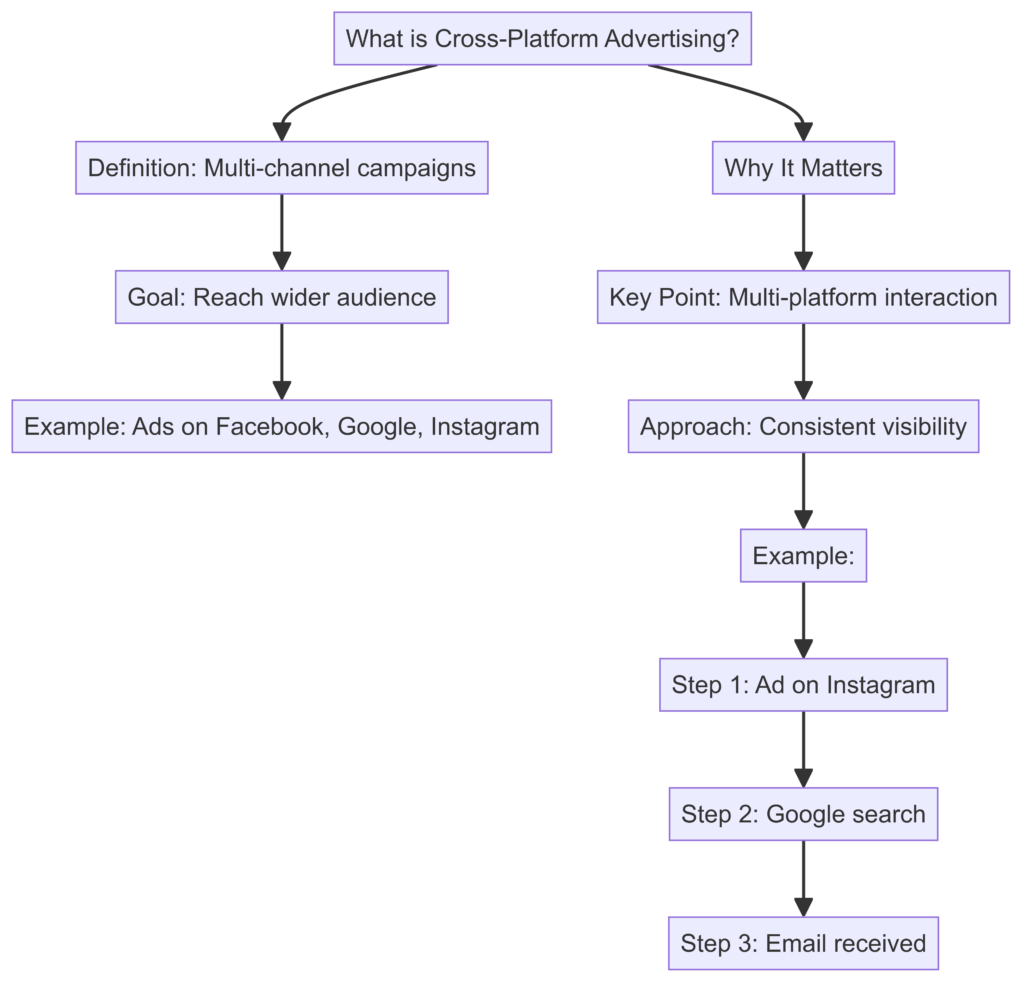
In today’s digital world, people use multiple platforms every day – from social media and search engines to email and websites. To capture their attention, businesses need to advertise on all these platforms in a coordinated way. This is called cross-platform advertising. Let’s explore some easy strategies to help you create successful cross-platform campaigns.
Understanding Cross-Platform Advertising
- What is Cross-Platform Advertising?
- Why It Matters
- People interact with brands on different platforms during their day. A coordinated approach ensures they see your message everywhere they go.
- Example: Someone might see your ad on Instagram, search for your product on Google, and then get an email from you.

Setting Up for Success
- Define Your Goals
- Clearly decide what you want to achieve with your campaign. Is it more brand awareness, leads, or sales?
- Tip: Use SMART goals (Specific, Measurable, Achievable, Relevant, Time-bound) to stay focused.
- Know Your Audience
- Understand who your target audience is and which platforms they use the most. Create detailed profiles of your ideal customers.
- Example: If your audience is young adults, focus on platforms like Instagram and Snapchat.
Developing a Unified Message
- Consistent Branding
- Keep your brand’s voice, tone, and visuals the same across all platforms. This helps build recognition and trust.
- Example: Use the same logo, color scheme, and tagline on all ads.
- Tailored Content
- While your core message should be consistent, adjust your content to fit each platform’s style.
- Example: Use bright images and short text for Instagram, and more detailed posts for LinkedIn.
Leveraging Platform Strengths
- Social Media
- Use the unique features of each social media platform to engage users.
- Example: Use Instagram Stories for behind-the-scenes content and Facebook for community building.
- Search Engine Ads
- Take advantage of high-intent searches by running targeted Google Ads.
- Tip: Use relevant keywords and compelling ad copy to attract clicks.
- Email Marketing
- Reinforce your message through personalized email campaigns.AI Email Marketing
- Example: Send follow-up emails with exclusive offers to people who interacted with your social media ads.
- Display Ads
- Use visually appealing display ads to capture attention across the web.
- Tip: Retarget visitors who have been to your website to keep your brand top-of-mind.

Coordinating Your Campaigns
- Integrated Campaign Management Tools
- Use tools like HubSpot, Hootsuite, or AdRoll to manage and track your campaigns across different platforms.
- Tip: These tools help you schedule posts, monitor performance, and ensure consistent messaging.
- Cross-Platform Analytics
- Track and analyze the performance of your campaigns on all platforms. Use these insights to improve your strategy.
- Example: Google Analytics and Facebook Insights provide valuable data on user interactions and conversions.
Budget Allocation and Optimization
- Allocate Your Budget Wisely
- Distribute your budget based on each platform’s performance and audience engagement.
- Tip: Start with a test budget to see which platforms work best, then allocate more funds to those channels.
- Optimize in Real-Time
- Continuously monitor your campaign performance and make adjustments as needed.
- Example: If Facebook ads are doing better than Google Ads, shift some of your budget to boost Facebook campaigns.
Measuring Success
- Key Performance Indicators (KPIs)
- Define KPIs to measure the success of your campaigns, such as click-through rates (CTR), conversion rates, and return on ad spend (ROAS).
- Tip: Regularly review your KPIs to make sure your campaigns are on track.
- A/B Testing
- Test different versions of your ads to see what works best.
- Example: Try different headlines, images, and call-to-action buttons to find the best combination.
Conclusion
Cross-platform advertising is essential to reach today’s multi-device, multi-platform consumers. By understanding each platform’s strengths, maintaining a consistent message, and using integrated tools, you can create coordinated campaigns that drive results. Ready to take your advertising to the next level? Start planning your cross-platform strategy today!214us

